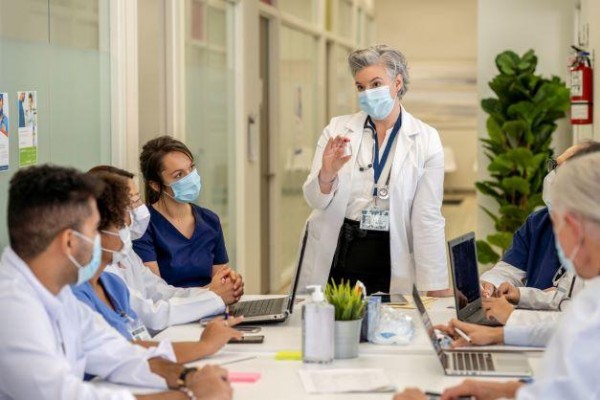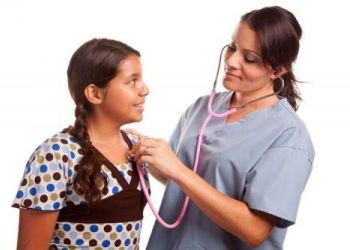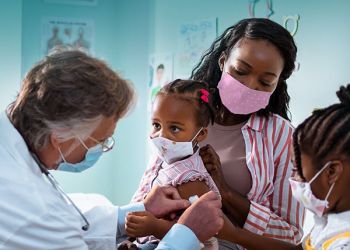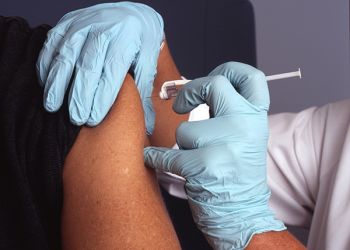The COVID-19 vaccine has been proven safe and effective in protecting people from COVID-19 infection and significantly lessening the risks for severe illness and death. Despite the success and strong safety record of the COVID-19 vaccine, vaccine hesitancy and lack of confidence continues to pose a significant threat to public health. To date, 80.3%* of individuals 12 and up have received at least one dose, many Americans remain unvaccinated. Vaccine confidence across the lifespan for COVID-19 is critical to increasing vaccination coverage rates and protecting the health of individuals and communities’ nation and worldwide.
To help support local health departments (LHDs), NACCHO partnered with the Centers for Disease Control and Prevention (CDC) to host a COVID-19 Vaccine Confidence Bootcamp, a 2-hour long training to provide LHDs with strategies for building vaccine confidence in their communities. Over 200 attendees participated representing a variety of LHDs across the country with varying geographic distribution and population sizes. During this training, attendees were provided an update on the state of COVID-19 vaccine confidence in the United States, received an overview of vaccine confidence concepts, engaged in a facilitated breakout session to brainstorm strategies for building vaccine demand, and learned where to find CDC COVID-19 vaccine confidence and communication resources.
Additionally, two LHDs were highlighted to present their lessons learned and challenges implementing the COVID-19 vaccine in their communities. Moffat County, a rural frontier jurisdiction in Colorado, discussed how surveying vaccine appointment no-shows highlighted the barriers that needed to be addressed. From these findings it was noted that the vaccine clinics were difficult to find, the time slots were inconvenient, and there was a lack of reliable information. Moffat County Health Department addressed these barriers by offering mobile clinics, adjusted times to accommodate working community members, and offered appointments on the weekend. Additionally, they utilized trusted messengers in the community such as pastors to help spread accurate information. They were able to get 50.9% of the eligible population to receive at least one dose, compared to 23% prior to these strategies. Boston Public Health Commission discussed their strategy of hiring bilingual (English, Spanish, Arabic, Haitian Creole, Vietnamese, Mandarin, Cantonese, and Somali) COVID outreach specialists to communicate accurate and timely COVID information to hard-to-reach populations, populations most impacted by COVID-19, and residents that expressed vaccine hesitancy. Trusted messengers were selected to distribute masks, sanitizer, and factsheets to these populations while also getting feedback on resident’s concerns, identify resources needed, and answer questions. This allowed for bilateral communication between the health department and the populations to increase vaccine confidence and uptake.
After hearing success stories from the field, participants were split into small groups based on their jurisdiction size to participate in a breakout activity. The “Ladder to Building Demand” is intended to help participants identify strategies to build demand for COVID-19 vaccines tailored to their communities, focusing on six critical areas: accessibility, benefits, convenience, desirability, normativity, and necessity. A population of focus was selected in each group such as young adults, African Americans, people experiencing homelessness, and immigrants. Each group worked its way up the ladder, analyzing tailored strategies. Some examples of strategies that came out of the activity:
- Accessible: To increase COVID-19 vaccine demand, it is important to make the vaccine easily available in locations that the populations of focus may frequent. Participants provided examples including offering vaccines at workplaces, schools, via mobile clinics, places of worship, libraries, community centers, and other community events. To address transportation barriers, participants recommended providing home-based vaccination services or partnering with rideshare or other transportation services. Additionally, translation services, support with technology when registering, and not requiring identification were mentioned to increase accessibility.
- Beneficial: For people to feel confident in the COVID-19 vaccine, they need to believe that the benefits outweigh the risk. A strategy highlighted was sharing data and trends relevant to the population served, focusing on the benefits and facts. LHDs are implementing social media campaigns to provide residents with weekly updates on data and vaccination information.
- Convenient: After individuals identify the vaccine as accessible and beneficial, it still needs to be at a reduced opportunity cost. Agencies must make vaccines convenient and remove barriers people may have. Offering paid time off from work, providing transportation and childcare, and ensuring the clinics are open on the weekend are some of the strategies LHD’s are using. They also partner with community organizations and businesses such as barber shops, grocery stores, and faith-based organizations to offer vaccines where people are already frequenting.
- Desirable: To increase vaccine demand in communities, residents must see it as appealing to them. LHD’s need to get creative in thinking of ways to get people to want the vaccine. Many agencies have found success in offering incentives such as gift cards or free tickets to community events. Another strategy included making vaccine clinics a family event, offering food and drinks as well as games the whole family can enjoy.
- Normative: Eventually, the COVID vaccine should be seen as a normal social default in the community. Continuing the conversation around getting vaccinated can increase confidence among those who are reluctant. Encouraging people in the community to share reasons for getting vaccinated on social media has proven to be successful. LHD’s have also been encouraging peer educators and trusted messengers to share testimonials and help answer common questions or worries among hesitant individuals. Agencies are creating vaccine ambassador programs to allow a safe environment for sharing experiences and educating residents.
- Necessary: COVID vaccines are becoming indispensable for accessing things people want to get back to doing. They are necessary if people want to get back to a sense of normalcy. LHD’s are implementing the requirement of proof of vaccination to enter restaurants, bars, or events. Additionally, requiring vaccination to engage in recreational activities or camp making it necessary for those who are younger to get vaccinated.
At the end of the Bootcamp, participants felt more prepared to discuss strategies to increase vaccine demand in communities as well as building vaccine confidence. Overall, participants found the training to be helpful and they were able to take away new knowledge on tips and best practices for vaccine confidence.
*Data as of 11/23/21. COVID Data Tracker: COVID-19 Vaccinations in the United States (https://covid.cdc.gov/covid-data-tracker/#vaccinations_vacc-total-admin-rate-total)
Resources:
Ways Health Departments Can Help Increase COVID-19 Vaccinations | CDC: Provides strategies and resources to use when planning and implementing activities to generate demand for COVID-19 vaccinations. These include guidance for building COVID-19 vaccine demand in different settings and tips for how to build trust, address misinformation, and tailor messages and materials.
COVID-19 Vaccination Field Guide: This guide outlines selected strategies to help increase vaccine confidence and uptake and includes examples from communities currently using these strategies.
How to Engage the Arts to Build COVID-19 Vaccine Confidence: Includes field guides, resources, and examples public health professionals, health communicators, teachers, and community organizations can use in their work to increase COVID-19 vaccination confidence and demand through the arts.
COVID-19 State of Vaccine Confidence Insights Reports: CDC reports about the status of COVID-19 vaccine confidence in the United States, emphasizing major themes that influence vaccine confidence and uptake.
Rapid Community Assessment Guide: Designed to identify communities at-risk for low vaccine uptake, better understand the local community’s vaccine needs and decisions, and identify areas of intervention and prioritize potential intervention strategies.
COVID-19 Vaccine Print Resources: Navigate to the COVID-19 Print Resources and search by keyword, or filter by audience or topic for free print-only materials to support COVID-19 vaccination recommendations.
National Resource Center for Refugees, Immigrants, and Migrants (NRC-RIM): Access resources that support with vaccine planning, roll-out, knowledge, and confidence among RIM communities.





